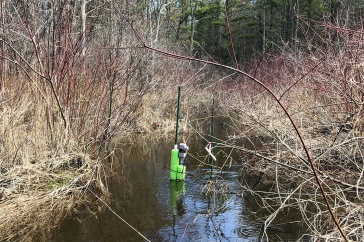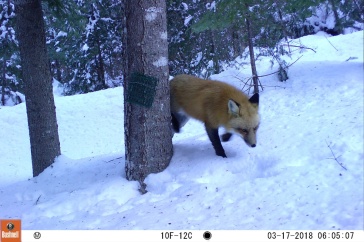
Jeffrey Foster holds a Ph.D. in ecology and evolutionary biology from the University of Illinois and a bachelor’s degree in biology from Northwestern University. Credit: Perry Smith, Perry Smith Photography
Assistant Professor, Department of Molecular, Cellular and Biomedical Sciences
Researcher with the NH Agricultural Experiment Station
Why did you decide to become a university researcher?
Growing up I loved being outside in nature doing activities such as hiking and fishing. Doing work out in the field was always a career aspiration, but I wasn’t totally sure how to go about it. For my undergraduate, I went to a university with limited options for fieldwork so it wasn’t until I graduated that I really got my boots dirty in a series of field jobs throughout the western United States and Pacific. I took a series of positions for various state and federal agencies doing work on fish, bats, birds, deer, and other animals until I found my niche in ornithology. That focus has expanded into other areas, particularly infectious diseases and various genetics projects, but I’ll always have a passion for the bird research.
What is your current area of research?

A primary focus of my research is infectious disease of wildlife and livestock, particularly white-nose syndrome in bats, brucellosis in cattle and other animals, and malaria in birds. My NH Agricultural Experiment Station work is an offshoot of one of these disease projects. In studying the decline of bat species due to white-nose syndrome, we realized that knowing which insects bats are eating and how they are consuming is a really important question. We are using new molecular methods to rapidly identify in their guano the various insects and other arthropods that bats are eating; sure beats my previous work identifying arthropods only using a microscope.
What drew you to this research? Why are you passionate about it?
I am especially interested in conservation so often my research involves work that aims to have meaningful contributions to our understanding of the natural world. My work, whether it be in the lab, on the computer, or out in the woods, allows me to connect with the earth’s ecosystems and its inhabitants.
What issues are you trying to address?
For my bat work we are trying to understand the diets of bats. For example, are they consuming pests threatening our forests? In other areas we can see if they are eating agricultural pests or human pests such as mosquitoes. Bats are incredibly efficient samplers of insect communities, especially those insects that fly at night. Because they return to their roosts at the end of each evening, we can wait for them to poop. Analysis of the genetics of the insects in this guano gives us a wealth of information about where they were foraging and which insects are currently active in an area.
What do you enjoy most about being a researcher?
The ability and freedom to pursue important scientific questions that most interest me. I also enjoy the numerous challenges that I’m faced with each day when trying to interpret and present my findings.
To learn more about Jeffrey Foster’s work, visit http://fozlab.weebly.com/.
Founded in 1887, the NH Agricultural Experiment Station at the UNH College of Life Sciences and Agriculture is UNH’s original research center and an elemental component of New Hampshire's land-grant university heritage and mission. We steward federal and state funding, including support from the USDA National Institute of Food and Agriculture, to provide unbiased and objective research concerning diverse aspects of sustainable agriculture and foods, aquaculture, forest management, and related wildlife, natural resources and rural community topics. We maintain the Woodman and Kingman agronomy and horticultural farms, the Macfarlane Greenhouses, the Fairchild Dairy Teaching and Research Center, and the Organic Dairy Research Farm. Additional properties also provide forage, forests and woodlands in direct support to research, teaching, and outreach.
-
Written By:
Lori Tyler Gula, PhD | NH Agricultural Experiment Station | lori.gula@unh.edu | 603-862-1452
















































